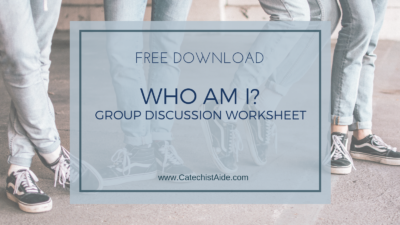
Middle school students, just entering adolescence, are undergoing a tremendous amount of growth on every level – physically, emotionally, and cognitively. Amidst this rapid growth and development, they are also on a course to discover and define their own identities distinct from their parents. In fact, this might be considered the central task of adolescence, to begin to answer the question, “Who am I?” Students may not be able to articulate the process, but as they are exposed to new environments, social situations and influences, they begin to develop a sense of self that is foundational to who they will be as adults.
The Worksheet
The Group Discussion Worksheet, “Who Am I?” is intended to have students think about and identify what influences how they view themselves as individuals. The conversation begins by identifying cultural and societal influences. It then moves to what it means to be made in the “image and likeness” of God. What are the implications of this fundamental truth for humanity and myself?
Scripture verses provide the answer to the question, “Who or what does God say that I am?” Does it change the way I feel about myself to know that God loves me, has chosen me, and I am His heir?
Lastly, we look to Psalm 139, which tells us that God, who “knit me in my mother’s womb,” knew us before we were born. How does this affect how I look at myself, knowing that God has willed and loved me into being? Does knowing that God already knows my failures and loves me anyway, change the way I see myself?
Takeaway for Students
People will come and go in our lives, and our situation will change. There is one constant in our lives, however, and that is God’s eternal love for us. Many things factor into who we are as individuals. Our identities are shaped by our experiences, our friends, etc. But, if that’s all they’re based on, then we continuously have to perform, achieve and please others to maintain that identity.
If we can begin to see ourselves as God sees us, then we can trust that His love for us isn’t based on what we do, who we are friends with or how fashionably we dress. Knowing this gives us confidence that we don’t have to achieve to be loved. And our mistakes and failures will not define who we are. The loving and merciful God who made us loves us as we are. All He asks of us is that we respond in love.
Click the link below to download the Group Discussion Worksheet with Leader’s Guide to try out with your class. Be sure to make a copy of the Worksheet for each of your students. The Leader’s Guide is for you and any other discussion leaders.
Group Discussion Worksheet on Identity
© 2018 Catechist’s Aide
Leave a Reply